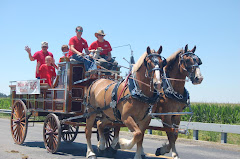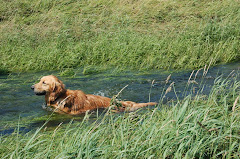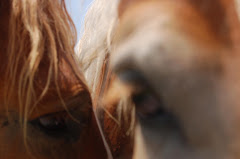Equine Herpes Virus
EHV-1 stands for “Equine Herpes Virus-1.” It’s given the “1″ because there are several herpes viruses that affect horses and this one was named first. Otherwise, the “1” has no significance. Herpes viruses are very successful viruses, if you measure success in terms of how many of them there are, and how many mammalian species are affected. There are herpes viruses of horses, and people, and dogs, and cats, and pigs, and cattle, probably several other animals as well. Herpes viruses are successful for two main reasons:
1)They usually don’t hurt the host very much. That’s right, most of the time, herpes viruses are unnoticed by the host. It doesn’t do a virus much good to go killing off its host – that’s one reason why you don’t see Ebola virus spreading rapidly around the world. If the host doesn’t live, the virus can’t spread. Mostly, herpes viruses don’t cause much fuss. They are sort of like the quiet family that lives in the dark house down the street, or in the apartment down the hall. If you didn’t know that they were there, you wouldn’t know that they were there.
2)They have cleverly figured out how to evade the body’s immune system. Once a horse gets infected with a herpes virus, the virus finds a nice home, usually in and around nerves. There, they stay nice and quiet (medical folk say latent), until some stress causes the virus to activate and start causing trouble. And the fact that they can evade the body’s immune system also means that, so far, nobody has been able to develop an really effective vaccine against them.
Do you get cold sores? Something like 70% of the human population does. Most of the time, people with cold sores have perfectly normal looking lips. But add some stress – say, illness, tax returns, school (for kids) – and, BOOM, you end up with a big, painful knot on your lip. Then, the body fights it off, and the virus goes latent, waiting for another stressful opportunity.
In horses, depending on the study you read, it’s estimated that as many as 50% (or more) carry the latent EHV-1 virus in some form. Sending 700-some horses to Ogden, Utah to compete in a horse show was the equine equivalent of sending the kids to school. Panicked, excited, stressed, and packed together, it was an absolutely perfect scenario for the herpes viruses to come out and play. So, some poor horse – one of hundreds that were probably carrying the virus – stressed, and far away from home, broke with the virus, which reproduced, and then spread to other horses. Think kids in school with a cold: one of them gets sick, and before you know it, everyone gets sick.
Remember when I said that herpes viruses usually don’t hurt the host very much? Well, that’s usually true. Unfortunately, in some cases, the EHV-1 virus gets into the horse’s nervous system and causes a great deal of mischief. It can even cause horses to die. This is unfortunate, and also not uncommon with viruses. And, we do not completely understand why some horses will develop the neurologic form and other horses do not. Researchers believe that the variety or strain of virus, the horse’s own immune system and the environment all play a role in determining which horses will develop the neurologic form. The good news is most horses that get exposed to the EHV-1 virus DON’T get neurologic disease.
Of course, no one wants any horse to get sick, ever, so, understanding that, your reasonable question would be, “What can/should we do?”
And my response would be, “Go out and enjoy your horse. The EHV-1 virus is pretty much everywhere. Your horse has probably already been exposed at some point in his life.
A big question exists concerning vaccination for herpes virus. Unfortunately, there’s no really good herpes virus vaccination that completely prevents any form of the disease caused by herpes virus. This isn’t just a horse thing; there’s no really good herpes virus vaccination against any disease of any species. (And, that is another reason why herpes viruses are so successful). With that said, there are several, commercially-available vaccines that we use routinely in horses. These vaccines are labeled (approved by the FDA) to prevent infection or reduce disease of the respiratory and abortion strains. No vaccine prevents the neurologic form of herpesvirus. Vaccinating against herpes virus might help to decrease the shedding of the virus and the spreading of the virus among horses. The best advice is to consult your veterinarian concerning vaccination---not only when discussing herpesvirus but to develop an entire vaccination program that best works for you and your horse.
The best things that you can do to avoid herpes virus is to practice good hygiene measures, that is, the types of things that people should do with their horses anyway (but often don’t).
For example, new arrivals to farms should be quarantined for a few weeks before being introduced to new horses. People working around horses should wash their hands often so that they don’t carry disease. If you’re working around a sick horse, change your clothes before moving on to the next horse. Don’t crowd horses together. Feed them well. Get them fresh air and exercise. All common sense and but important, too.
Bottom line is EHV-1 can be a bad deal for individual horses. Quarantining sick horses, or horses that were exposed at the show in Utah was absolutely the right thing to do. But for most horses, EHV-1 will not cause disease. So, be prudent and be cautious. Use good hygiene measures. And discuss with your veterinarian the risks and benefits of vaccination.
A special thanks to Dr. David Ramey in Sunland, CA for letting me "steal" his information about EHV-1. Check out his website for more great equine information @ www.doctorramey.com
A special thanks to Dr. David Ramey in Sunland, CA for letting me "steal" his information about EHV-1. Check out his website for more great equine information @ www.doctorramey.com











No comments:
Post a Comment